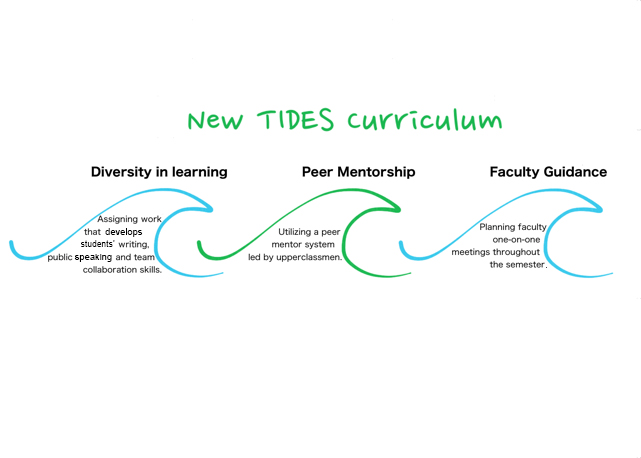Freshmen seminar revamped, rebranded as TIDES 2020
The Tulane Interdisciplinary Experience Seminar Program has been redesigned as TIDES 2020.
According to Associate Director of Academic Programs Cristina Lawson, Tulane altered TIDES in response to reports written on the undergraduate experience at Tulane. Based on the report, it was found that TIDES could more efficiently connect students to campus life. Tulane’s goal is to have every TIDES course under this new model by the fall of 2020.
“The model encourages faculty to think about their classroom differently, enhancing the curriculum through experiential learning and discussion-based pedagogy to provide a more engaged experience,” Lawson said.
Certain “anchors” focusing around concepts encountered by all first-year students will be incorporated into the TIDES curriculum. Anchors include diversity and inclusivity, faculty guidance and peer mentorship.
Some TIDES professors believe the anchors have been important and relevant to their courses already.
“I think that those values are great and will be easy to incorporate in many ways,” Yonah Schiller, “A Spirituality Survey” TIDES professor, said. “They are already embedded in much of the class. We look at spirituality from many different perspectives and the idea behind that is we try to be inclusive of many different personalities, perspectives and backgrounds.”
Planning faculty-student one-on-one meetings throughout the semester is one main component of TIDES 2020.
“It sounds like a great idea because I think a lot of the students feel the need to make connections when they are first getting here, and it seems like a great way to do that,” Schiller said.
In addition, TIDES 2020 will implement a peer mentor system led by upperclassmen who will help first-year students understand what resources are available to them.
“I think it is a great idea and I think there is a lot in my course that specifically has to do a lot with emotional and personal wellness … ” Schiller said. “I think connecting the incoming students or new students with students who have already kind of figured out ways and strategies to live a healthy life at Tulane is a great way to give newcomers some real skills and application to their Tulane experience.”
Brian Horowitz, TIDES “Religion, Media, Politics, and Food: A Conversation on Contemporary Life” professor, however, expressed skepticism about the feasability of a peer mentoring system.
“One thing at Tulane is that students are very involved in activities already,” Horowitz said. “They already have Greek life, then there’s so much going on, but I think the idea of getting people to meet who wouldn’t normally meet is really good.”
Faculty are encouraged to incorporate field trips, speakers and meals into their course curricula to build greater community.
Lastly, TIDES 2020 will require assignments that develop students’ writing, public speaking skills and team collaboration skills.
“So already [my students] sometimes work in pairs or in groups, but I think that the idea is that we want to have conscious, thinking individuals who are involved in the community, involved in political life and involved in cultural life,” Horowitz said. “So I think that any kind of program that develops these skills, the ones you are talking about, would be good.”
Because of the redesign of the TIDES program, common themes will unite all courses.
“It sounds like it will bring together many other TIDES classes under a sort of shared values of practices, and I think they will probably allow students to be able to dialogue with their friends about the various types of classes in a way one may now feel that it is a separate journey,” Schiller said.
Although this program will not be fully implemented until 2020, TIDES will be progressively moving toward standardizing these values among courses throughout the next couple years.
“I have big aspirations for the TIDES program,” Lawson said. “There is real opportunity to use this space to support first-year students in such positive ways, and I look forward to seeing how this new model might positively impact Tulane students.”
Your donation will support the student journalists of Tulane University. Your contribution will allow us to purchase equipment and cover our annual website hosting costs.



Leave a Comment